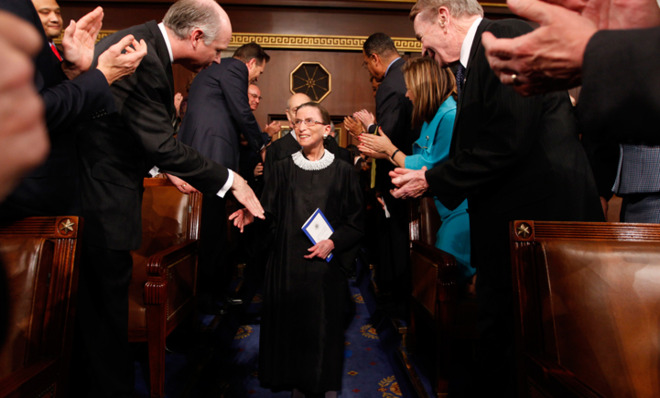The case for term-limiting Supreme Court justices
Lifetime appointments were meant to preserve judicial independence. But the high court has devolved into a political body with too much power.

A free daily email with the biggest news stories of the day – and the best features from TheWeek.com
You are now subscribed
Your newsletter sign-up was successful
Unlike in nearly every other democracy in the world, justices appointed to our highest court remain there for life. This is purportedly done to promote judicial independence. But in reality these lifelong Supreme Court appointments generate an absurd political spectacle: A court that is both nakedly partisan and less democratic.
For starters, because judges have lifelong terms, openings on the court come at totally random intervals. As a result, the number of judges any given president appoints varies widely. Jimmy Carter appointed zero judges in his one term, while Bush Sr. appointed two. Clinton appointed two judges in his two terms, while Eisenhower appointed five.
Filling up the court in such a random manner makes its overall political composition more random as well, rather than a democratic reflection of the political trends of the country as a whole.
The Week
Escape your echo chamber. Get the facts behind the news, plus analysis from multiple perspectives.

Sign up for The Week's Free Newsletters
From our morning news briefing to a weekly Good News Newsletter, get the best of The Week delivered directly to your inbox.
From our morning news briefing to a weekly Good News Newsletter, get the best of The Week delivered directly to your inbox.
Indeed, it is worse than mere randomness. Supreme Court judges are not replaced only when they die, but also when they retire. This makes it possible for judges to strategically retire only when they are certain they will be replaced by a president with the same ideological commitments. The relatively conservative Sandra Day O'Connor, for instance, retired during Bush Jr.'s presidency. The relatively liberal John Paul Stevens and David Souter retired during Obama's presidency.
And now, a heavy push is under way to get the liberal Ruth Bader Ginsburg to retire in time for Obama to suitably replace her. If these strategic retirements continue, the court's political composition will never change, other than when accidents occur.
For those who think judges are apolitical umpires of the law, this might not seem like that big of a problem. But those people would be wrong. Judges are totally political, especially those on the Supreme Court. We have become so used to this reality that current coverage of the court already assumes a 4-4 split in the most contentious cases, with the swing vote Anthony Kennedy breaking the tie.
In a recent study of 516 free speech cases, researchers found that the justices were far more likely to protect speech when its sentiment aligned with their own political orientation. This was much more true for conservative justices than liberal justices, but still true of both.
A free daily email with the biggest news stories of the day – and the best features from TheWeek.com
Contrary to our idealized expectations, the Supreme Court largely appears to work the way Richard Posner claims it does. The justices figure out what they want the outcome to be, and then they interpret the law to justify that outcome, unless the prevailing law makes it brazenly ridiculous to do so. Because law is composed of words, and words are vague and open to multiple interpretations, a huge space exists for judges to act as political legislators — and they do.
So what does that leave us? A Supreme Court that is an eminently political institution whose composition is at best random and at worst a function of strategically timed retirements. This makes no sense and needs to be reformed.
The best reform proposal I've seen is the brainchild of law professor Paul Carrington. Under his proposal, Supreme Court judges would serve single, staggered 18-year terms, such that a new judge would be appointed every two years. This fixes the issue of randomness, which can create huge judicial windfalls for certain presidencies. It also fixes the strategic retirement problem, since judges would be forced out after 18 years.
Furthermore, it allows the court to change in line with the political tides of the country. The ideological composition of the court at any given time should generally mirror that of the presidency in the 18 years prior.
This is not a partisan proposal. In fact, the most high-profile proponent of it in recent years was Rick Perry, the Republican governor of Texas.
Think about it this way: Since the Supreme Court is already a mostly political body that has taken upon itself to legislate, it only makes sense to treat it like a kind of legislature. You wouldn't appoint senators for life and allow them to effectively choose their successors. We shouldn't let Supreme Court justices do that either.
-
 Minnesota's legal system buckles under Trump's ICE surge
Minnesota's legal system buckles under Trump's ICE surgeIN THE SPOTLIGHT Mass arrests and chaotic administration have pushed Twin Cities courts to the brink as lawyers and judges alike struggle to keep pace with ICE’s activity
-
 Big-time money squabbles: the conflict over California’s proposed billionaire tax
Big-time money squabbles: the conflict over California’s proposed billionaire taxTalking Points Californians worth more than $1.1 billion would pay a one-time 5% tax
-
 ‘The West needs people’
‘The West needs people’Instant Opinion Opinion, comment and editorials of the day